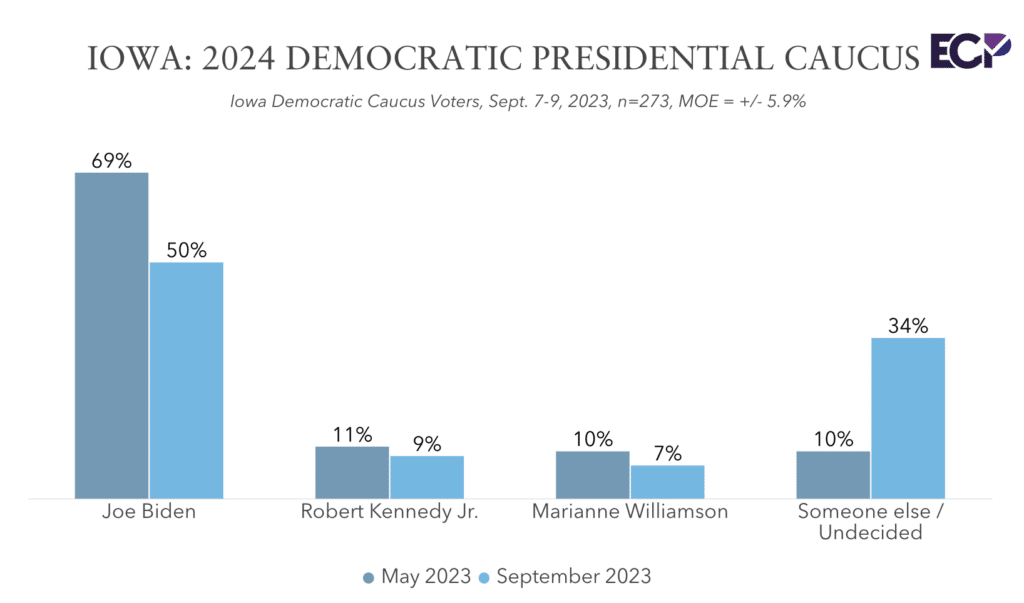Neither Party with Clear Alternatives to Frontrunners
A new Emerson College Polling survey in Iowa finds former President Donald Trump with 49% support in the Republican Caucus, followed by Florida Governor Ron DeSantis with 14%, U.S. Senator Tim Scott with 8%, former U.N. Ambassador Nikki Haley at 7%, and entrepreneur Vivek Ramaswamy at 7%. Six percent are undecided.

Since the May Emerson Iowa poll, Trump’s support has decreased 13 points, from 62% to 49%. DeSantis dropped six points, from 20% to 14%, Scott’s support increased five points, from 3% to 8%, Haley’s support increased two points, from 5% to 7%, and Ramaswamy five points, from 2% to 7%.
Spencer Kimball, Executive Director of Emerson College Polling, said: “Trump holds the majority of support among voters without a college degree, but his support decreases to 28% among those whose highest level of education is a college degree, and 27% with a postgraduate degree. Twenty-four percent of those with a college degree support DeSantis, but the Florida Governor’s support drops to 16% among postgraduates with Haley earning 20% of this vote.”
Sixty-one percent of voters say they will definitely vote for their candidate, while 39% say there is a chance they could change their mind and vote for someone else.
“Trump supporters are the most likely to stick with their candidate as 79% say they will definitely vote for the former President, while just 21% say they could change their mind,” Kimball noted. “Conversely, 71% of Scott voters, 70% of Haley, 56% of DeSantis and 46% of Ramaswamy voters say there is a chance they could change their mind and vote for a different candidate.”
Since the May Emerson Iowa poll, Biden’s support has decreased 19 points in the Democratic Caucus, from 69% to 50%, while Robert Kennedy Jr., dropped from 11% to 9% and Marianne Williamson dipped from 10% to 7%. Thirty-four percent are undecided.

“Biden has lost some support in the Democratic caucus, with a large number of voters being undecided,” Kimball said. “Young voters and women voters are two groups who have lower support for Biden than their counterparts: only 38% of Democratic voters under 30 support Biden in a caucus, and 41% of women are undecided.”
Kimball continued, “While both Biden and Trump have lost some support in Iowa, it does not appear that any other candidate has been able to emerge as a clear alternative. Republicans saw DeSantis fall back into the pack, as the vote splintered amongst a crowded field, and Kennedy and Williamson have failed to gain traction in Iowa.”
A third of Iowa voters (33%) approve of the job Joe Biden is doing as president, while 54% disapprove of his performance in the Oval Office. Since May, Biden’s approval has decreased two points while his disapproval has remained steady at 54%. Iowa Governor Kim Reynolds holds a 43% approval rating, while 41% disapprove of the job she is doing in office.
In a hypothetical presidential matchup between Donald Trump and Joe Biden, Trump leads among Iowa voters 50% to 39%, with 11% undecided. This has remained relatively unchanged since the May poll, when Trump also held an 11-point lead.
In a hypothetical ballot with Trump, Biden, and Green Party candidate Cornel West, Trump holds 48% support, Biden with 35%, and West pulls 5%. The share of undecided voters with West on the ballot increases to 13%.
Sixty-four percent of respondents say they will definitely vote for the candidate on the 2024 ballot they chose, while 35% say there is a chance they could change their mind and vote for someone else.
“A third party candidate on the ballot changes the dynamic of the race by pulling votes from both sides,” Kimball said. “However, West’s voters are more willing to change their minds than Trump and Biden voters: 72% of West voters say they might vote for another candidate, compared to about two-thirds of Biden and Trump voters who plan on sticking with them.”
The economy remains the top issue for a plurality (37%) Iowa voters, followed by healthcare (14%), education (12%), “threats to democracy” (9%), abortion access (6%), housing affordability (6%), and immigration (5%). Since May, concern for the economy has increased by six points, concern about education has decreased by three, and “threats to democracy” by six.
Voters were asked which of the following statements comes closest to their view on abortion law in Iowa: a ban on abortion at all times, a ban after six weeks of pregnancy, 20 weeks of pregnancy, or there should not be bans on abortion. Thirty-six percent of voters think there should not be bans on abortion, while 24% think there should be a ban on abortion at all times, 20% think there should be a ban after six weeks and 20 weeks respectively.
Regarding the drought in Iowa, 49% of voters have personally experienced the impact of drought in the past year, while 51% have not.
METHODOLOGY
The Emerson College Polling Iowa survey was conducted September 7-9 2023. The sample of Iowa registered voters, n=896, has a credibility interval, similar to a poll’s margin of error (MOE), of +/- 3.2 percentage points. The Republican caucus has a sample of n=357, with a credibility interval of +/- 5.1%. The Democratic caucus has a sample size of n=273, with a credibility interval of +/- 5.9%.
Data sets were weighted by gender, education, race, age, party affiliation, and region based on 2024 registration modeling. Turnout modeling is based on US Census parameters, and Iowa voter registration data. Data was collected by contacting an Interactive Voice Response (IVR) system of landlines and an online panel of voters.
It is important to remember that subsets based on demographics, such as gender, age, education, and race/ethnicity, carry with them higher credibility intervals, as the sample size is reduced. Survey results should be understood within the poll’s range of scores, and understand with a confidence interval of 95% a poll will fall outside the range of scores 1 in 20 times.
All questions asked in this survey with exact wording, along with full results, demographics, and cross tabulations can be found under “Full Results.” This survey was funded by Emerson College.
###







